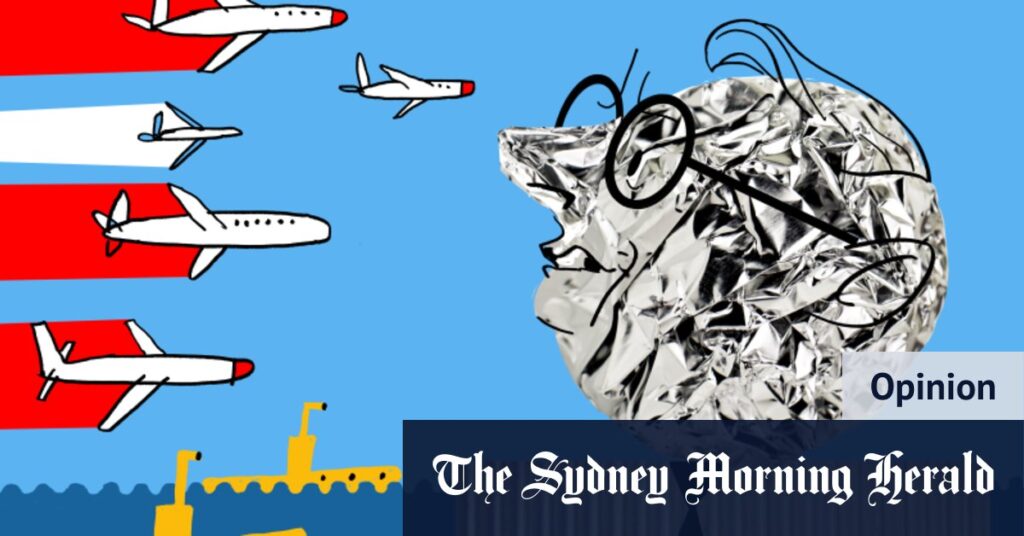Trump’s Commerce Secretary will be Howard Lutnik, the billionaire CEO of the financial services giant Cantor Fitzgerald and a fellow McKinley fan. Speaking at Trump’s pre-election Madison Square Garden rally, Lutnik claimed America was at its greatest when McKinley was president. “Our economy was rocking,” he declared. “We had no income tax, and all we had was tariffs.”

Malcolm Turnbull with Donald Trump in the Oval Office in 2018.Credit: Alex Ellinghausen
Both Trump and Lutnik, moreover, are close to Peter Navarro, a trade hawk with razor-sharp talons, who is now a senior counsellor in the new administration. On CNN this week, Navarro claimed Australia was “killing the aluminium market”, a Trump-sized exaggeration. But here, the success of Turnbull in winning exemptions in 2018 actually might boomerang on Albanese. The following year, aluminium exports surged to their highest level over the past decade. In a White House where the president is frequently influenced by the last person to have his ear, the Australians regard Navarro as public enemy number one. Countering his influence is central to their game plan.
In their “who’s who in the zoo” spreadsheets, a meticulously prepared power map of Trumpworld, Australian diplomats are more confident of dealing with Trump’s new trade representative, Jamieson Greer, a former Air Force lawyer and evangelical Christian closely involved in the first trade war in China.
On the Australian side, “Albo” cuts a wholly different figure than Malcolm. Trump developed a grudging respect for his fellow waterfront property owner, partly because he was wealthy, and partly because of his legal background – in Hamburg, Trump introduced Turnbull as “the best lawyer in the world” who “kept my friend Kerry Packer out of jail”.
Back then, Team Australia was also more MAGA-friendly. In the clubbable Joe Hockey – a term that applied both to his bonhomie and golf handicap – Australia had an ambassador who made himself right at home in Trump’s Washington. By contrast, Kevin Rudd comes with that unhelpful back catalogue of Trump barbs – something he shares in common with Vice President J.D. Vance and Secretary of State Marco Rubio.
Loading
Rudd’s forensic command of detail, not to mention his relentlessness, is seen within the government as a vital asset. Rudd is not only making the best arguments to the right people, it is said, but hunting down the right people and working every angle. Business leaders, governors, members of Congress. Besides, ultimately it will be the relationship between the present prime minister and president that counts.
The concertinaed timetable of a one-month deadline to avoid exemptions is problematic. Here, it does not help that cabinet officials such as Lutnick have not yet been confirmed by the Senate. Even getting face-time with new appointees can be tricky. “It’s bloody tough,” says a former DFAT official, “because everyone wants a piece of them.”
Missing this time around are friends of Australia from the first Trump administration, most notably perhaps the former defence secretary, James Mattis, who made the case forcefully about the importance of security and defence cooperation. On Capitol Hill, the waning health and power of the former Republican Senate majority leader and Australia advocate, Mitch McConnell, is seen as a significant setback.
There is another key difference between this time and last: AUKUS, an acronym that literally inverts the philosophy of America First. Yet the idea behind it, as a beachhead against Beijing, appeals to China trade hawks within the Trump administration. Last week, in what looked like an act of feudalism before Trump’s increasingly monarchical court, the Australian government also proffered its first downpayment of $800 million to finance future submarine production at American shipyards. Few things appeal to Trump more than seeing American coffers swelled by an alliance partner ponying up eye-catching wads of cash.
In recent decades, prime ministers have demonstrated impressive persuasive prowess in successfully cajoling US presidents. Paul Keating talked Bill Clinton into elevating APEC into a “heads of government” summit. John Howard persuaded a sceptical Clinton to provide US logistical support for the Australia-led East Timor operation. Rudd prevailed upon George W. Bush, and later Barack Obama, to make the G20 the primary diplomatic forum during the global financial crisis. Turnbull, first over the refugee deal and then with tariffs, succeeded with Trump.
Two key lessons emerge. First, that prime ministers and presidents do not have to be ideologically aligned to find common ground. Second, the Australian case has to be centred not on America altruism but naked US self-interest.
All this also makes a mockery of Bill Bryson’s sledge about the anonymity of Australian prime ministers. Obama saw Rudd as his wonkish kindred spirit. Bush labelled Howard a man of steel. Will Trump anoint Albanese the champion of Australian aluminium?
Nick Bryant, a former BBC Washington correspondent, is the author of The Forever War: America’s Unending Conflict with Itself.

